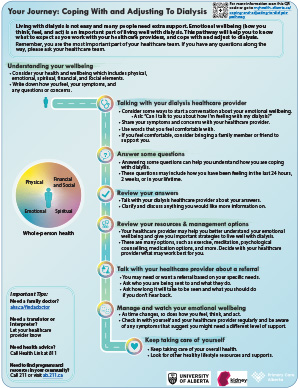Your dialysis healthcare provider can help you better understand your emotional well-being and give you important strategies to live well with dialysis. Changing daily habits and starting new activities such as being active, eating well, meditation, breathing techniques, and journaling can have major impacts on your mood.
Your friends, family members, and healthcare team are great resources to listen to you and help you with your dialysis journey. Joining a support group can also broaden your support network by connecting you with others who are living with dialysis.
Referral
Depending on your conversation with your dialysis healthcare provider, they may also refer you to another dialysis healthcare provider, like a family doctor, kidney doctor, nurse practitioner, dialysis nurse, pharmacist, social worker, dietitian, exercise therapist, spiritual health care provider, or psychologist. Social workers and psychologists are often specially trained to discuss challenges you may be experiencing when adjusting to or coping with dialysis.
If you or your healthcare provider are very concerned about your emotional well-being and personal safety, they will make an urgent referral to another healthcare provider or emergency department.
Medicine options
Medicines can also have a positive impact on your daily mood and any feelings you may be experiencing. Your dialysis healthcare provider may suggest starting or changing a medicine. This is a good time to explore medicine options and how they may fit into your dialysis journey. Starting, stopping, or changing a dose of these medicines needs to be watched carefully. Do not make any changes before discussing this with your healthcare provider.
Based on an open discussion with your healthcare provider, they may suggest a medicine based on your health history, allergies, symptoms you are experiencing, and other medicines you may be taking. Every person and medicine is different. For most people, it can take 2 to 8 weeks to see any difference in mood after starting a new medicine. And it can take 8 to 12 weeks or more to see the full effects of the medicine.
Watch for changes in your mood
Remember to watch for changes in your mood and how you are feeling. It is normal for your mood to change from day to day, and some days may be better or worse than others. Call your healthcare provider, Health Link at 811, or the Alberta Mental Health Help Line at 1-877-303-2642 if you have any concerns. Call
right away if you have:
- severe changes in mood
- concerns about your emotional well-being and safety
- thoughts of harming yourself or others
Your healthcare provider should be regularly checking in on how you are coping with and adjusting to dialysis, and after any major changes in your life. If you would like to bring the discussion up again during your next appointment, consider asking: “Last time we met, we talked about how I was coping with dialysis. Can we talk about how the last weeks and months have been for me?”

Your Journey: Coping With and Adjusting to Dialysis
Download or print the
full patient pathway (PDF) and
summary (one-page PDF) to learn more about what to expect as you work with your healthcare team and cope with and adjust to dialysis.
Patient Pathway  Summary
Summary 
